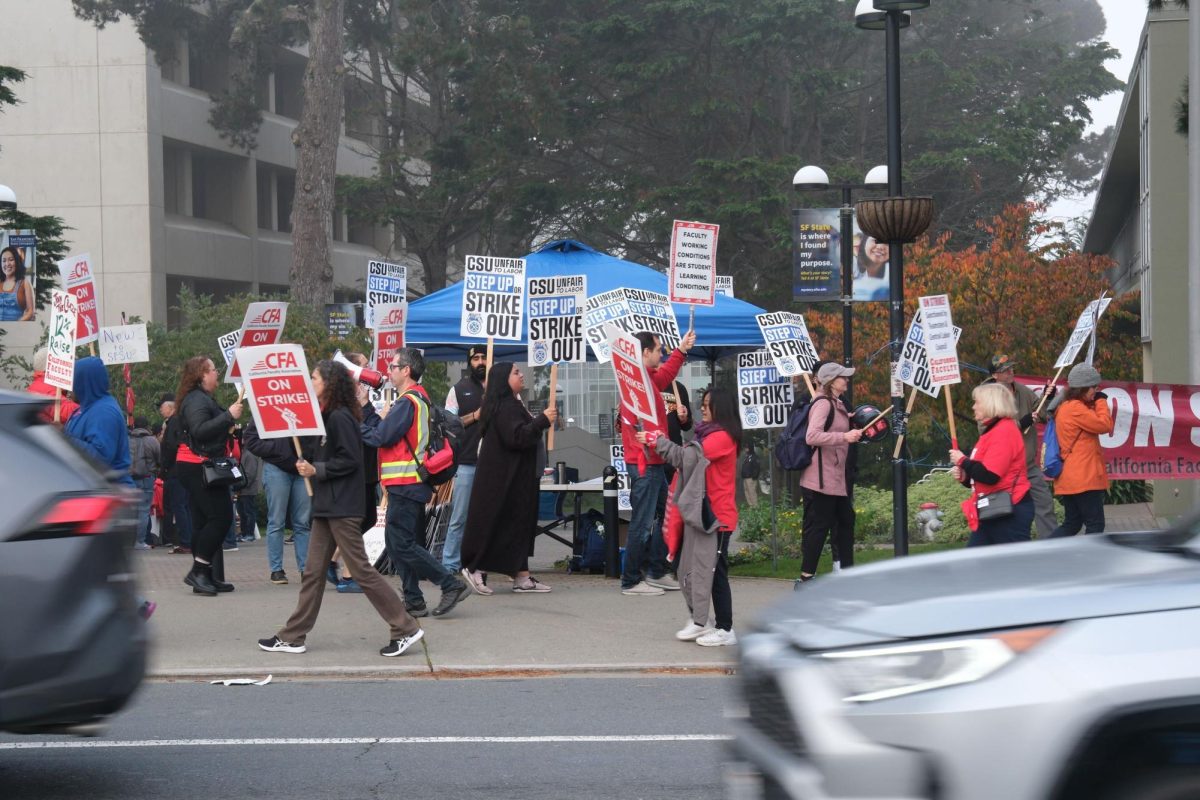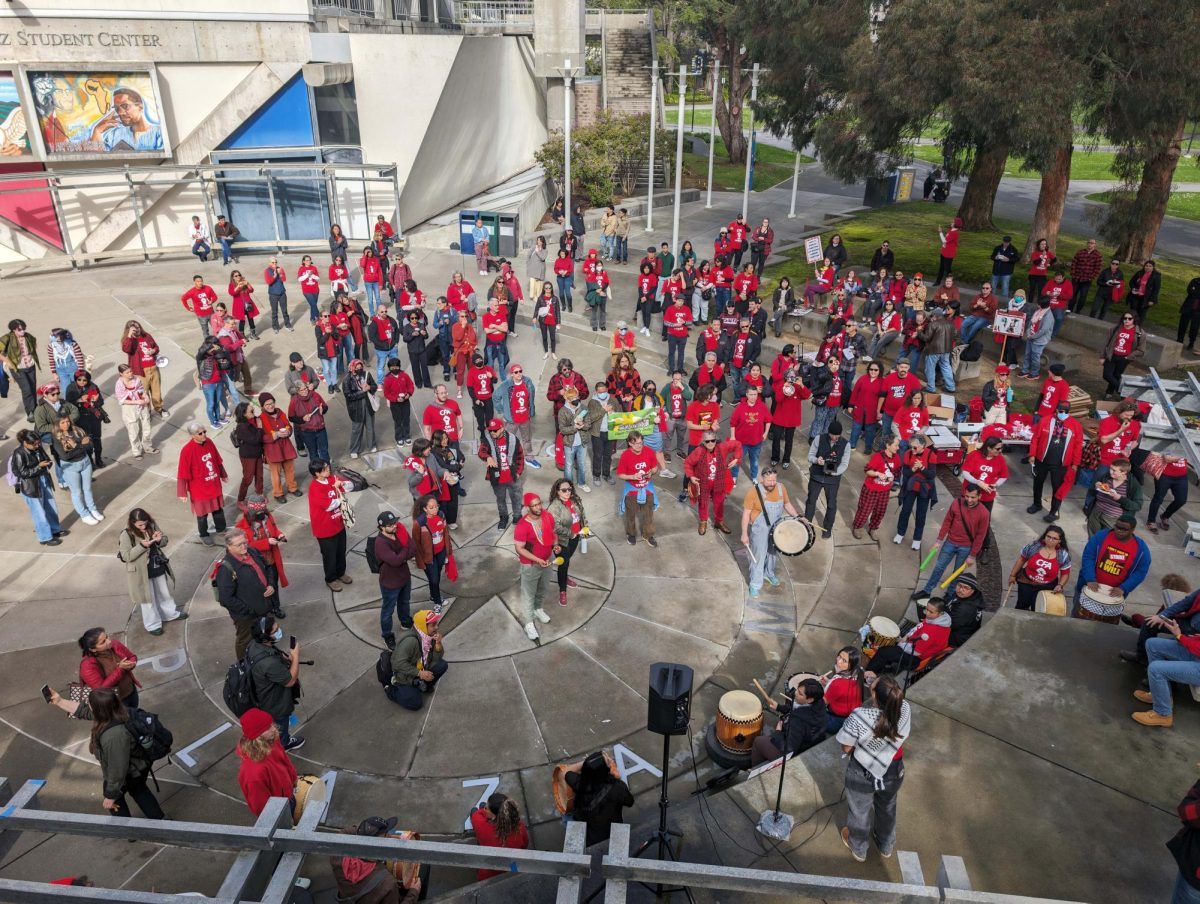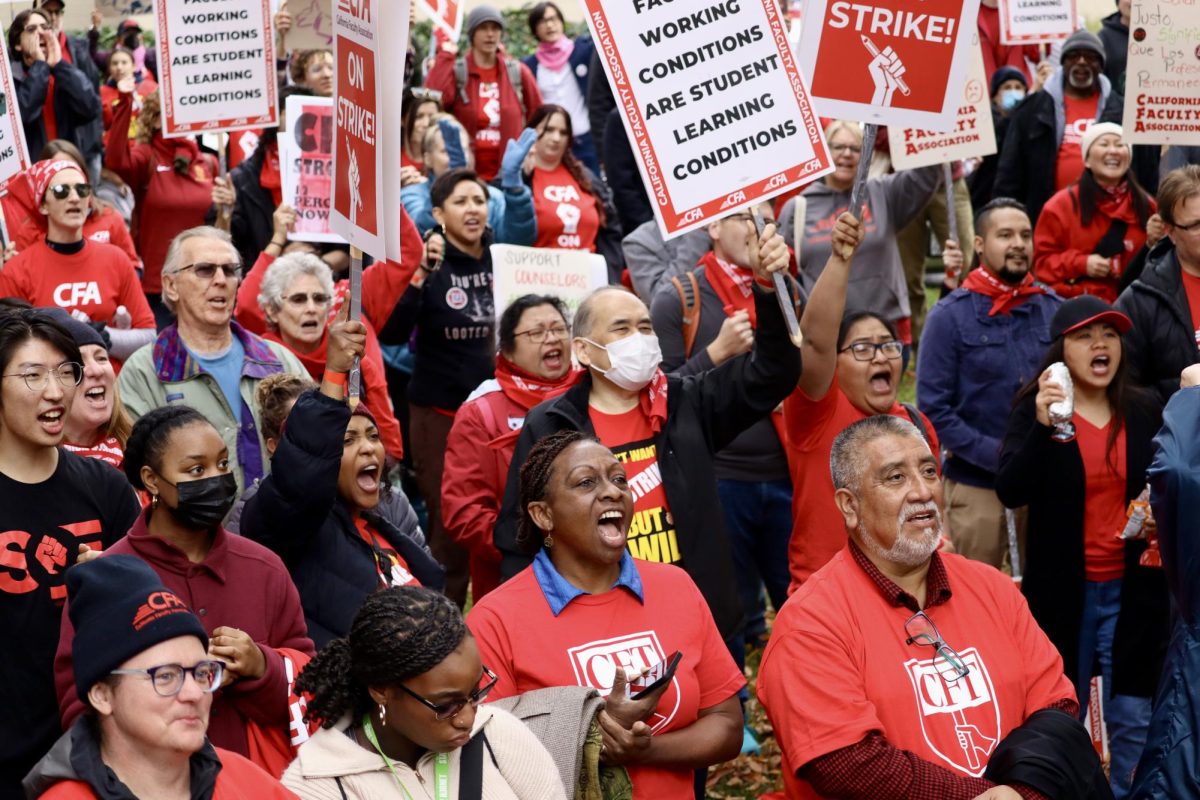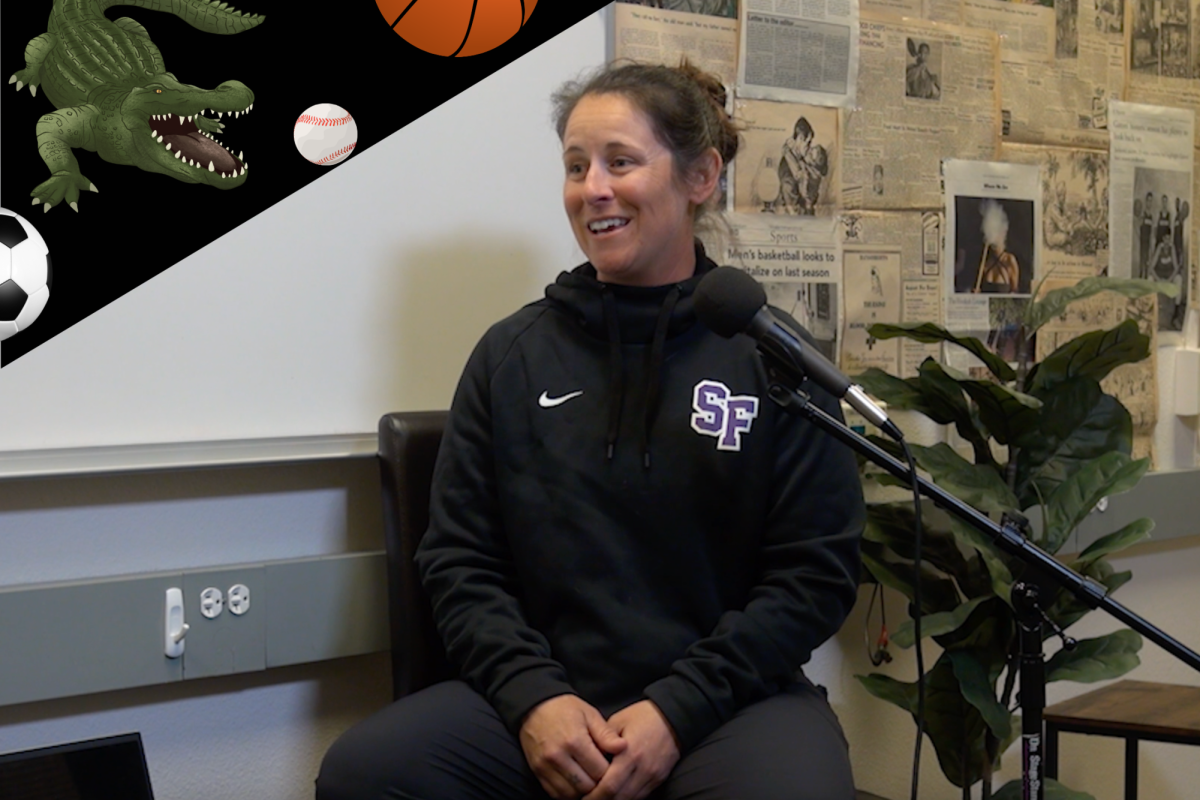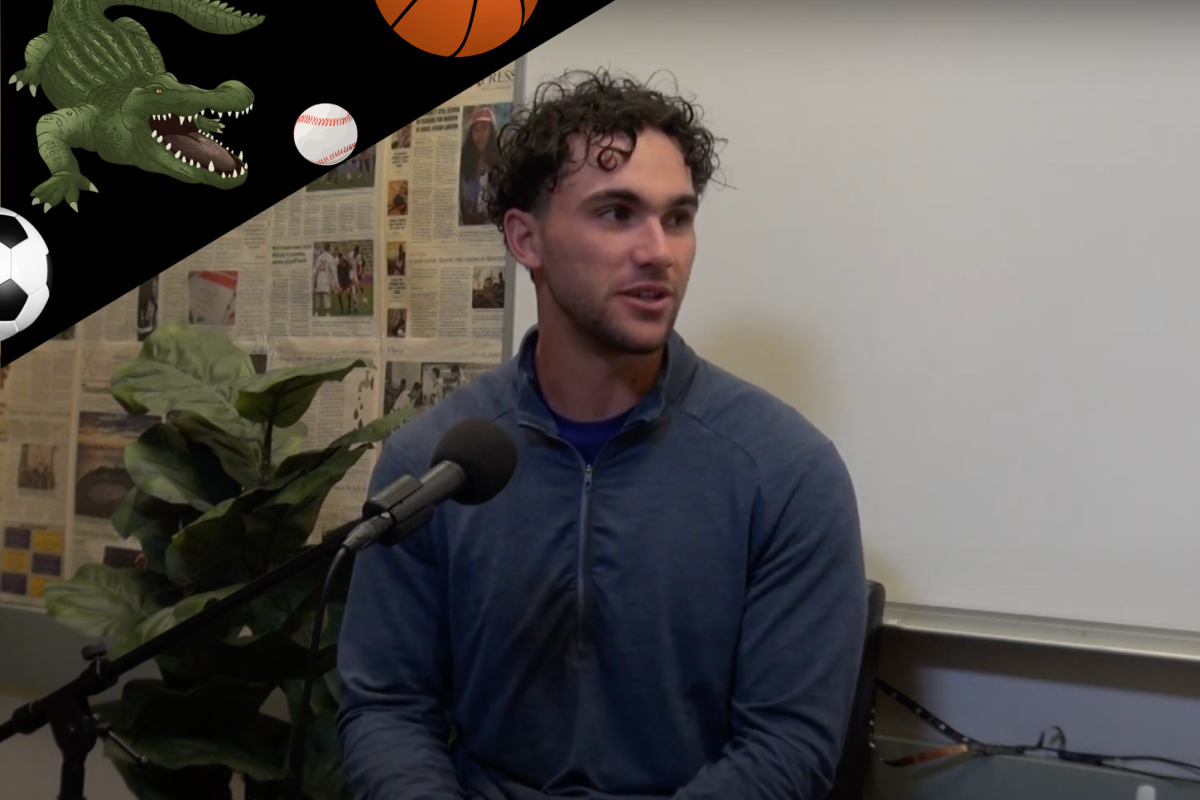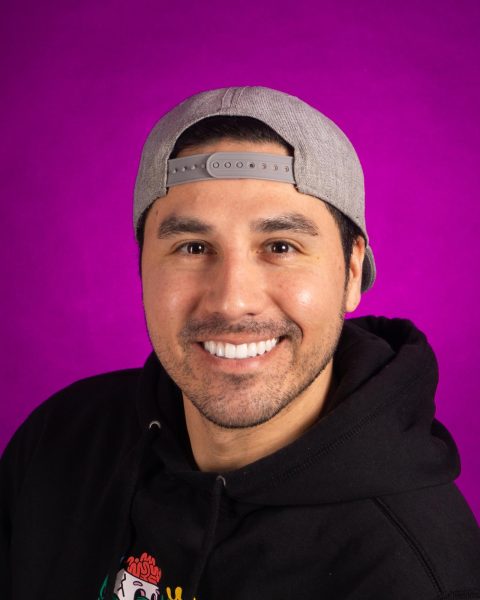Welcome back to Gator Talk, the Xpress podcast that brings city perspectives to local, regional and national news. In today’s podcast episode, staff reporters Sophia Osborn and Zac Zavala sit down and break down their union coverage on the different unions on campus.
Intro
Sophia: Welcome back to Gator Talk. My name is Sophia Osborn
Zac: And I’m Zac Zavala.
Sophia: We’ll be your hosts on this episode of Gator Talk.
Preview of the Story
Zac: Today, we’ll be continuing our series surrounding labor discussions happening around the San Francisco State University campus.
Sophia: Zac and I have both recently covered unions. I’ve covered the California Faculty Association.
Zac: And I’ve covered the student union side of things.
Sophia: We decided to sit down to compare and contrast our experiences covering the subject, along with some new updates.
Zac: All of this and more coming up next on Gator talk. Let’s get started.
Interview
Sophia: Hi Zac, how are you doing today?
Zac: Good, and yourself Sophia?
Sophia: Doing well. Thank you. Alrighty, so let’s hop right into it. So I know both of us have done some union coverage in the last semester, I suppose. So go ahead and tell me a little bit about the stuff that you’ve been covering.
Zac: Yeah, I mean, just overall in general, just, you know, covering unions, and really getting to know what unions are about, they exist for many reasons, which I’ve been able to learn, primarily to advocate, like the rights of interest for its workers. And then also just giving me a deeper understanding as a reporter, and from my perspective, and also giving me insights into the different challenges and dynamics that each unit has as well.
Sophia: Yeah, for sure. So let’s start with some questions about your Student Union coverage. So just the general gist of it, I’m just pulling from the Student Academic workers set on a tentative agreement with the CSU. So earlier today, we spoke and you said that they have actually accepted this agreement. Correct?
Zac: Yes, So I mean, really just, you know, going straight into it, the faculty members, you know, after the, let’s see the after speaking with members of the Union, I’ve been able to keep in touch with them. So sometimes I’ll be able to check in with them just to make sure that if there’s any improvements on what’s been done thus far. I’ve also been able to just touch base with them and I’ve been able to learn that the tentative agreement was sent to the Board of Trustees, and the student workers voted to ratify the new contract by a margin of 98.8%, which then led to the CSU Board of Trustees to vote on ratifying the contract on their meeting on November 7. So that’s great news. I mean, that’s super helpful in a way that we’re able to show the public, show others that by unifying as a group together, that the strikes matter.
Sophia: Yeah, for sure. So kind of what you were saying earlier about how you can keep in touch with these people? What was building that relationship, like with them, like in your store, you have some stats in here that came from one of your sources, and just kind of building that connection? Like, how was it gaining that trust and sort of like, I guess, embarking on the reporting journey?
Zac: That’s a good question. I mean, by first reaching out through members of the Student Faculty Union, they were more than happy to talk to me, and they wanted their story out there. I mean, by having these real conversations with them, I was able to hear their frustrations of, you know, the Union itself, what they wanted in their new contract, and by hearing this range of emotions, I was able to really understand where they were coming from because at the end of the day, they were just trying to heighten their way of living their way of, you know, just making a living wage. I mean, the system is an old one that we’ve been able to deal with for a long time, and I think it’s finally plateaued, and it’s time for a new contract that matches the current economy, and, you know, offers people a living wage, like I said before.
Sophia: Yeah, for sure. So we’ve both covered unions, I’ve covered more CFA union stuff, and you’ve covered Student Union, the CFA, as well as the Employees Union. And we have an Employees Union podcast out now. So how does that differ I guess the coverage that you did on the Union, in your article, CSU employees union continues to fight for living wages. So how was it going about and kind of you have a great graphic here, but like getting that stats and like, again, building those relationships with this different union?
Zac: I mean, by going straight to the source by making sure that their website is, you know, updated and making sure that I’m able to, you know, first do my homework. I mean, like, do the research first before asking the different questions for the sources, because then the sources can relate to what you’re trying to ask them, and it then furthers the conversation with, okay, this person knows what they’re talking about, let me further that information or provide further information that I’m able to add to the story.
Zac: What type of CFA support? Have you seen when covering union stories? And where does this support usually come from? You know, the students? CSU management?
Sophia: Yeah. So whenever I’ve been out there, I’ve covered now three different CFA events and hopefully counting. Each time I go out there, I see the same CFA members out there on the picket line — not picket line, but you know, the rally line, and, you know, fighting for what they believe in, because they do deserve a higher wage. And, you know, as a reporter, we have to go into those situations, unbiased and neutral. But I think it’s important to know, the just kind of the difference in between, I guess, of separating the personal aspect from it, as well as like getting the story because we’re really there as reporters to cover both sides of the story and everything that is involved. And so with these rallies that I’ve been to and covered, I’ve seen a lot of support from students, from faculty. Never see any administration out there, though and, you know, just understandable, because that is who they’re, you know, trying to, you know, get their attention, I suppose. But, I mean, I’ve seen a couple of my friends, my personal friends out there, and just like, you know, they’re out there supporting their professors, and they’re supporting their faculty and their lectures, because their wages are being cut, and just their everyday lives are being threatened. And I think it was something like $60,000 is what they get annually, and that’s not a livable wage. And so yeah, there was a release about our school going on strike on December 5, and it’s gonna be a rolling strike following a couple of different campuses. So I guess we will see if management settles with the CFA or not.
Zac: Yeah, that’s very interesting. And when you’re talking about cuts in one of your stories I had read, you know, we talked about the, you know, administrators, cutting classes, laying off campus employees and hiking student tuition. How do you — what do you think that says to the general public? Of that’s the perfect recipe to raise enrollment rates?
Sophia: It’s a good question. I mean, without getting like, you know, too biased to it. Tuition is expensive, we are in like one of the cheaper “tuition schools”, I suppose. But raising the tuition by something like $370 per year for the next six years. And then cutting classes and cutting faculty is, it’s not an ideal thing for anyone involved. And I mean, I see it every single day, I’m in a different class, and we talk about like the classes that have been cut, like, I know, a couple of people who aren’t going to be able to graduate on time, because like that one class they need for like, their core requirement isn’t being offered in the spring or the fall or whenever they’re supposed to graduate. So that’s the most damaging part about all of this I think, is like deterring students from keeping that progress track. And it’s really, it offers a negative mentality to it too, because you’ve put in all this work. And then you see that like, this thing that you’ve been working toward, or like it’s upper division class, or like a seminar, and now you can’t take it because classes are being cut, and professors are being fired — not fired, but you know, laid off and like, faculty isn’t going to be able to come back, lectures. So it’s all just like all umbrellas under the same thing, and it’s all tied together, and it’s hard to figure out one problem when there’s so many that all lead to one bigger overall problem. And so I think that these unions that are speaking out, and rallying and striking, and, you know, standing up for their rights is a really important thing for them to do. And I think we’re living in a very interesting period of San Francisco State University history.
Zac: I agree with everything you just said. Unfortunately, even though these unions are specialized by department or special management groups, it is a butterfly effect. You know what I mean? It eventually catches up with everyone and then affects more people than what we think it will affect.
Sophia: Yes, exactly. And it’s like, me personally, I’m the oldest of three, right?
Zac: Same.
Sophia: There you go, you know what I’m gonna say then, it’s just like the trickle-down effect, like, will my siblings be able to have the same opportunities that I had? For like a lower price? I suppose. It’s just the people who come after us are going to face these issues more so if they don’t get resolved now with us.
Zac: I agree.
Sophia: Yeah.
Zac: What has been the most rewarding aspect of reporting on unions for you?
Sophia: Oh, that’s a good one. Well, I’ve only covered CFA unions. So I’ve seen a couple of different friendly faces, so to call them when I’m out covering and everything. And it’s nice to be able to catch back up with them. And like, see the emotion that brings with like, my reporting that I do. Like, for the Brad Erickson podcast, he’s the CFA-SFSU chapter president. And I was really moved by hearing what some of the CFA members had to say, they were like, we loved your podcast, you did a great job reporting, like, your coverage was great and we learned a lot of information that we might not have known prior to that. And so it’s not even just CFA members that have said that to me, it’s professors, it’s students, it’s my peers, like they didn’t know that logging onto canvas if we’re in a strike period would be crossing the picket line. They didn’t know that accessing the SFSU website would be crossing a picket line. And so just to be able to bring information that maybe wasn’t as clear back into the light, I mean, that’s the whole reason I got into reporting in the very first place is just to be able to give people the truth, and the whole truth and nothing but it.
Zac: I agree, well said. You know, with the student administrative workers, one of their main points with adding it into the new contract was better union organizing resourcing in the fact that a lot of people within the union itself don’t know a lot. You know what I mean? Like, they don’t know that they have specific rights within the workplace. And I think that within this new contract, that they’ve been able to ratify, that that’s going to be included that resources, or at least a budget for resources to educate more union members would be widely available. So they understand their union from the inside out, and that the union is working for them.
Sophia: What do you hope comes from the unions that are threatening to strike and that are striking? I know, Teamsters is striking tomorrow, so do you hope that they meet their, I guess, stances that they’re fighting for? What’s your hope as the designated union beat cover?
Zac: It’s a great question without being biased, I feel that the unions need to step up with the rest of the world. And when I mean, like unions, I mean just like in general, with making sure that each union gets an updated contract every few years. I mean, they’re only made to be a few years on purpose because they need to be ratified again, they need to be updated, wages need to increase. The world is changing and these union contracts need to stay up with the world because it affects real people that are tied to these contracts to live normal lives.
Sophia: Yes, absolutely. Well, that’s all my questioning for you, is there anything else you want to say?
Zac: No, thank you, though. Pleasure.
Outro
Sophia: Thank you for listening to Gator Talk. We hope you’ve enjoyed our interview. We’ll be back with more open discussion about the unions around campus. Follow us on social media @GGXnews, and keep up with all of our stories on GoldenGateXpress.com






